Sudan junta leader El Burhan’s speech leaves many sceptics unconvinced
The televised speech by the leader of Sudan’s ruling military junta, Gen Abdelfattah El Burhan on Monday, in which he announced the military’s withdrawal from the current governing bodies, and gave the civilian opposition groups in the country the opportunity to form a government of technocrats, continues to prompt mainly sceptical reactions in Sudan, while initial reactions from the international community say it is still too early to call.
 The leader of Sudan’s ruling military junta, Gen Abdelfattah El Burhan (File photo: SUNA)
The leader of Sudan’s ruling military junta, Gen Abdelfattah El Burhan (File photo: SUNA)
The televised speech by the leader of Sudan’s ruling military junta, Gen Abdelfattah El Burhan on Monday, in which he announced the military’s withdrawal from the current governing bodies, and gave the civilian opposition groups in the country the opportunity to form a government of technocrats, continues to prompt mainly sceptical reactions in Sudan, while initial reactions from the international community say it is still too early to call.
Malik Agar, head of the Sudan People’s Liberation Movement-North Agar faction (SPLM-N-Agar), leading member of the Sudan Revolutionary Front alliance of rebel movements that signed the 2020 Juba Peace Agreement with the government, and member of the Sovereignty Council considers the speech of El Burhan “a historical opportunity and a step forward towards removing the military establishment from the political process”.
At the same time, Agar called for more clarification concerning the powers and duties of the High Council of the Armed Forces that will be established soon.
Agar said in a statement yesterday that El Burhan’s speech answered the question of the relationship between civilians and the military, and responded to the demand of the street to return the soldiers to the barracks.
The former rebel leader said that he will present a detailed proposal for the distribution of powers and authorities during the next few days.
He noted that El Burhan’s speech omitted references to the Juba Peace Agreement, but stressed at the same time that it left a practical space for the implementation and development of the agreement.
Yasir Arman, Deputy head of the SPLM-N-Agar, on Tuesday announced in a lengthy article his categorical rejection of the speech of El Burhan.
Questions about ambiguity
The National Accord Forces, the popular name for the FFC-National Accord, announced they met with the head of the Sovereignty Council, El Burhan, on Wednesday, to make inquiries about the ambiguous points in his speech.
Mubarak Ardol, Secretary-General of the National Accord Forces and Director of the of the Sudanese Company for Mineral Resources said in a press statement that the meeting was clear and transparent. He did not clarify the ambiguous points in the speech or how El Burhan explained them.
Ardol called on all political forces, “except for the [affiliates of the dissolved] National Congress Party“, to prepare for concessions for the sake of dialogue and the formation of a transitional government that is compatible around it.
The army is above all
Feisal Mohamed Salih, Minister of Information during the government of PM Abdallah Hamdok, said that El Burhan’s speech is “a new attempt to confuse the scene”, stressing that the speech does not take the army out of politics and does not return it to the barracks, but rather puts the army above everyone else.
He explained in a statement that the speech resulted from the failure of the negotiation process between the military and the FFC due to the divergence of positions.
“El Burhan unilaterally identified the powers of the High Council for Security and Defence]. He unilaterally decided that the Sovereignty Council has no place in the structures of the transitional period, and unilaterally identified the tasks of the current negotiation process under the supervision of the Trilateral Mechanism concerning the formation of the Council of Ministers only,” Salih stated.
‘Too early to judge’
On Tuesday, US State Department spokesman Ned Price said it was too early to judge El Burhan’s speech.
In a press conference, he reiterated Washington’s support for the Sudanese people’s desire to advance the democratic transition under a full civilian leadership.
He indicated his knowledge of El Burhan’s speech and his commitment to dissolving the Sovereignty Council as soon as a civilian government is formed. He encouraged all parties to re-engage to find a solution that would maintain the trend toward civilian-led government, democracy, and free and fair elections. He called for an investigation into the violence against protesters and for the perpetrators to be held accountable.
Accountability
Kholood Khair, broadcaster and managing partner of Insight Strategy Partners, a think-and-do tank in Khartoum that works on transitional policy priority areas, tweeted yesterday evening her indignation at El Burhan’s speech.
She states that “those who have been accused of pilfering state coffers at the Sudan Mineral Resources Company and those who joined the now defunct Sovereign Council through the Juba Peace Agreement stay in position but those only there for window dressing (civilians in the Sovereignty Council) are axed.
“We’re meant to consider the Sudan Revolutionary Front [SRF] civilians (though they’re still armed & suspected of actively recruiting) and have them engage in intra-’civilian’ dialogue with those who not only resisted autocracy without resorting to violence but actually succeeded in bringing down Al Bashir,
“And following Burhan’s consolidation of the coup, the Tripartite Mechanism instead of understanding its own limitations will now work on intra-’civilian’ dialogue, ostensibly between civilians and non-civilians (SRF) [..] And by doing so, the Tripartite Mechanism leads the international community in buying hook, line and sinker, into El Burhan’s narrative that the issue is ‘divisions between civilians’ and not, y’know, the military who *staged the coup* and devastated Sudan. This is bizarre even considering the Tripartite Mechanism’s track record,
“And all the while of course, as has been the case, the real push toward civilian democratic rule is happening seemingly a world away on the streets, led by genuine changemakers. Whether through ignorance or incompetence history won’t judge kindly those who facilitate this farce,” she concluded her Twitter thread.
New professional declaration
23 trade union and professional groups announced yesterday that they agreed on joint action for the transitional period.
In their joint declaration, they stress the need for “the coup authority to step down immediately”, to establish a full transitional civil authority, to dissolve the institutions and structures of the coup’s rule and to remove the effects of the October 25 coup.
It stressed the return of the military to the barracks and the armed, security and police forces assuming their roles under the executive authority of the Council of Ministers, and stressed importance of a unified national professional army.
The declaration called for the accountability and trial of the criminals involved in the blood of the Sudanese.
Among the signatories to the declaration are the Democratic Alliance of Lawyers and the Central Sudanese Doctors Committee. The Preparatory Committee for the Restoration of the Sudanese Journalists Syndicate and the Gathering of Workers in the Judiciary and Other Entities.











 and then
and then